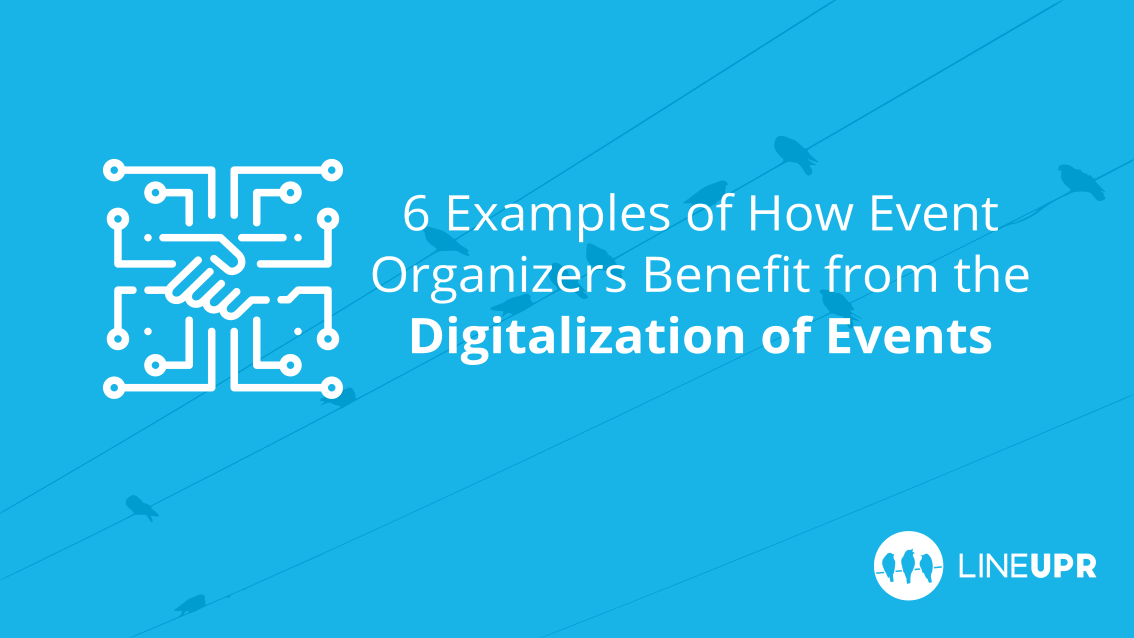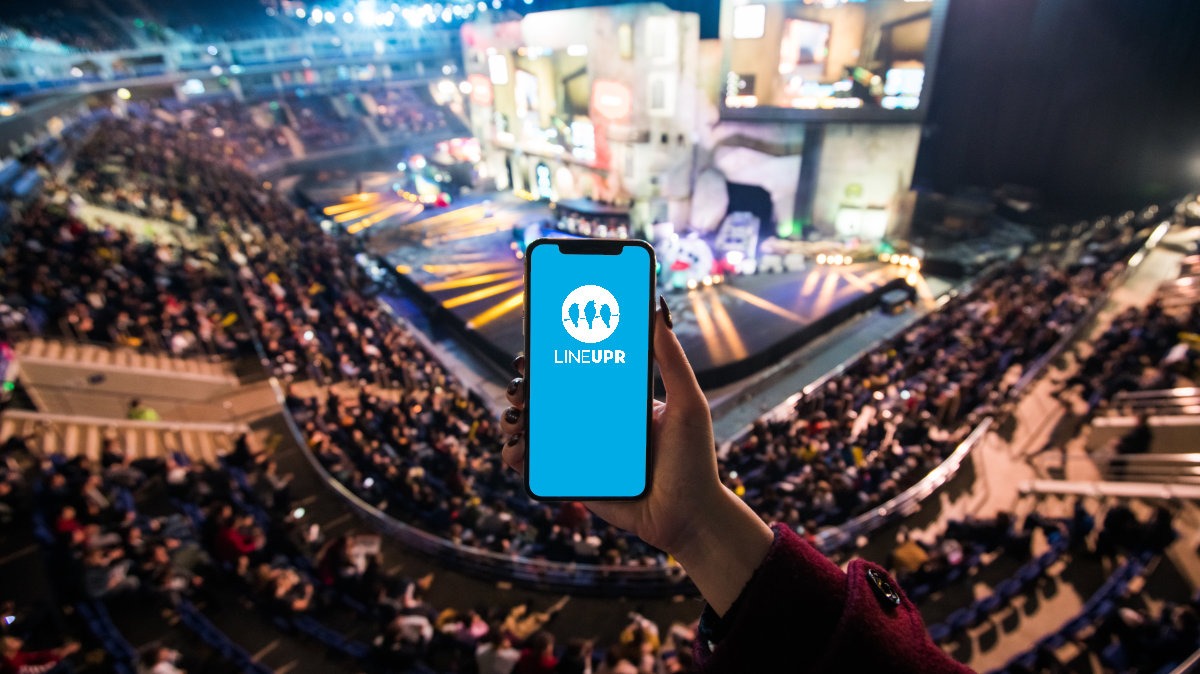Reading time: 5 minutes
The digitalization of our everyday life is unstoppable. Even for events, this development does not stop. And that’s good so. Technology helps you to save costs, to integrate your participants more in your events, to create more interactivity, to connect participants and to protect your wallet. For event organizers, the event planning, the marketing, the registration/sale of tickets and the communication of the event both on-site and online are of particular interest in digitalization. There are a ton of products for this. As an organizer, you can almost feel like you are in paradise.
We have 6 examples to show you why you too should digitalize your events.
1. More Time for the Important Tasks
Document the entire event concept on paper and adapt it to changes. Complete all team meetings in one place. Send marketing emails by hand. Receive and reply to registrations and questions by phone. How was it even possible to organize big events in the past? It needed a horde of employees, right?
Thanks to technical possibilities, now anyone can organize an event for 1,000 or more participants with a five-person team. Planning is done online and everyone always has access to the latest information. Thanks to bots and online chats, customer communication can be significantly optimized. Registrations and ticket sales are made online through standardized systems, as well as billing and shipping.
Thanks to a thousand little helpers, you can focus on the essentials and save a lot of time and stress.
2. More Networking at Your Event
It is omnipresent in the B2B sector. Why do people visit B2B events? Exactly, they want to expand their professional network. Whether potential customers, partners or service providers, most participants want to meet new contacts.
Sure, networking was possible even before the invention of the computer. Many successful networking professionals still swear by the direct approach with a friendly hello, but why make life difficult, when it can be easy. The trickiest part of networking is approaching an unknown person. There are now countless digital tools that make it easy for your participants to take that first step. The keyword is matchmaking. These tools will give your attendees suggestions on which other people at the event will suit them, based on interests, requirements, and contact requests. So the first step, the announcement, is made via such a tool. Usually one can then also arrange for a meeting on the spot. So no more cold dialogues and there is always a perfect topic for both sides as a conversation starter.
3. Fewer Costs
To be honest, whether digitalization will result in less cost to your event is entirely up to you. Basically, digital products and services offer you a lot of possibilities to save on time and, therefore, also on staff. At the same time, you can set specific goals, such as for example, promoting your event within a defined target group, with significantly more effective reach through online marketing, for example on Facebook or LinkedIn, instead of hanging up your event posters around the world.
Both ultimately lead to a massive cost reduction. At the same time, digitalization offers you a massive selection of new possibilities and instruments. Many organizers tend to invest in freed-up budgets directly into new strategies and products. If this leads to more success and higher sales, then nothing is against it. But you should make sure that you do not get caught up in the whole clutter and lose sight of your primary goal.
4. More Participant Interactivity
In terms of interactivity and personalization, many events have taken a giant leap forward thanks to digital tools. I still remember it from my grandfather’s stories. The good old days, when study results and new ideas were thrown on the wall with a slide projector, the participants had to endure hours of frontal presentations without being able to somehow influence the content. Times when one had to go to the information desk to get answers about the schedule or consult a thick paper booklet for the schedule. Or everyone could bravely come forward and then scream across the room to ask a question to the speaker.
Under these conditions, it is clear why the interactivity of the events was the way it was. Thank God that’s over. Today, organizers can ask their target group for their interests long before the event and tailor the event individually. Thanks to apps and websites, participants can easily ask anonymous or non-anonymous individual questions to the speakers. Lecturers can integrate the opinions and interests of their audience directly into the presentation thanks to living polls, and respond to each participant. And, and, and. A paradise of possibilities.
5. Better Customer Service
As we have already mentioned. In the past, large events almost required a small call center to answer all the questions about the event and to be able to carry out the ticketing or registration of participants. Thanks to new digital channels such as websites and email support, a small team is enough for today.
In addition to the cost savings, the efficiency and quality of your customer service also increase. Firstly, your participants can answer many questions on your mobile platforms, such as your website, themselves. Secondly, you can document frequent questions and develop optimal answers, so your service staff is prepared and can provide better answers. Thirdly, your participants do not always have to call if they have a little question. There are several contact channels available, and the younger generation prefers to chat over Facebook or Whatsapp rather than to call or send e-mail.
6. Viral Marketing – Word of Mouth Propaganda
It has never been easier to make your event famous overnight. Organizers used to have to print flyers and distribute posters throughout cities. Whoever has a bit bigger budget also used TV and radio advertising. What do these formats have in common? Participants cannot interact with it and increase the distribution through their own actions.
The situation with digital advertising looks completely different. When organizers publish interesting concepts, graphics, and videos online on platforms like YouTube, Facebook, or Instagram, anyone can interact with that content. You can like, comment, share, retweet and so much more. Firstly, as an event organizer, you get feedback on your campaigns much faster, and secondly, you can dramatically expand the reach of your content so quickly and cost-effectively. In traditional marketing, word of mouth meant that an enthusiastic participant may tell a few people in their immediate surroundings about you and your event. Today, they can reach hundreds of contacts via Facebook and Twitter with much less effort.
What You Should Have Learned
The digitalization of events has some challenges for event organizers, but at the same time, it offers you huge possibilities to optimize the planning and execution of events. With a clear focus and the knowledge of how to use the new products and services efficiently, the added value very clearly outweighs the effort. So get on the internet and start step by step to find digital helpers to provide participants with better service and content at your events.
“digitalized” Icon created by priyanka from “the Noun Project“.




